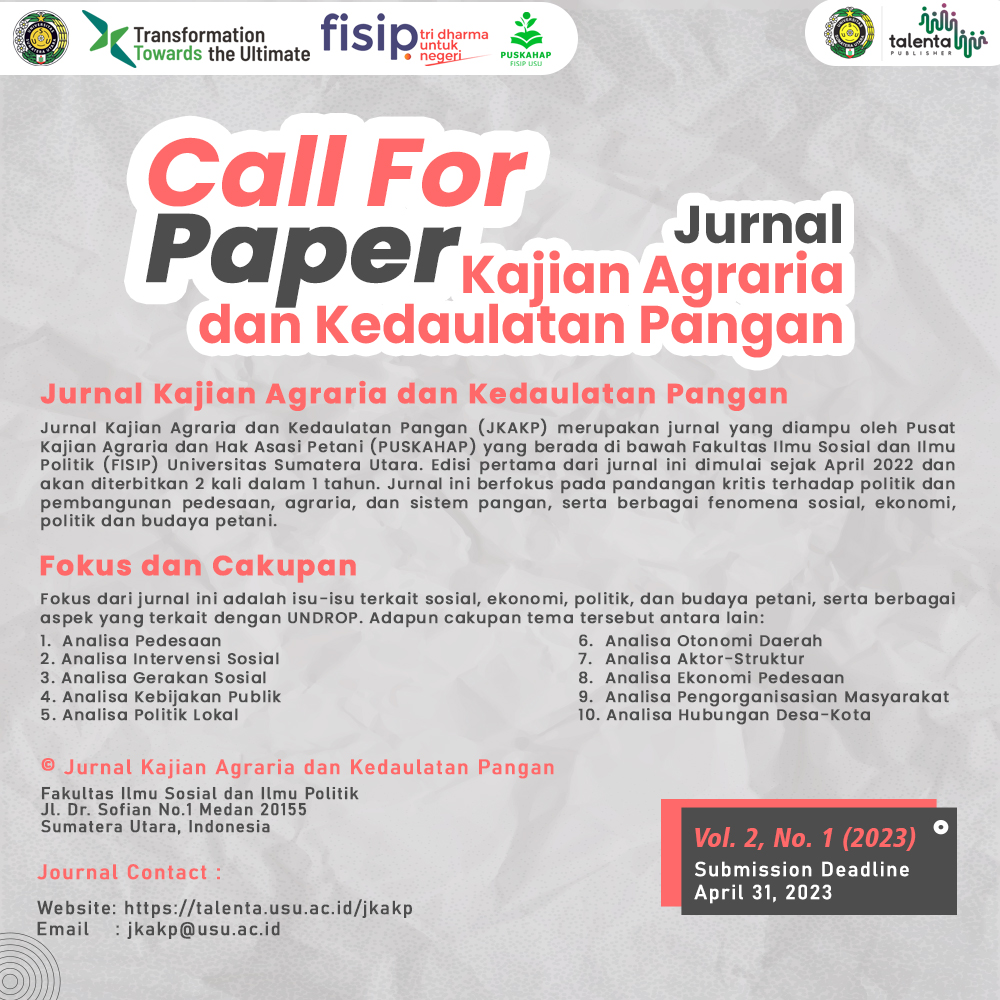Agrarian Reform in Occidental Negros, Philippines
DOI:
https://doi.org/10.32734/jkakp.v3i2.19077Keywords:
Violence, Negros Occidental, Agrarian conflictAbstract
Despite government implementation of agrarian reform programs, poverty and violence remain prevalent issues faced by communities dealing with agrarian problems. The dynamics of agrarian issues in Negros Occidental, a region rich in violent events related to agrarian reform policies, highlight the challenges. While the Philippine government initiated agrarian reform programs in the 1970s to redistribute land to landless farmers, aiming to promote wealth distribution and improve socio-economic conditions, implementation has not been successful. Bureaucratic inefficiencies and opposition hinder the reform process, leaving many vulnerable peasants economically insecure and in poverty. The complexity of agrarian dynamics in Negros Occidental involves strong opposition from landlords to agrarian reform, leading to systematic and structural violence. The engagement of various actors, such as the government, peasant communities, and corporations, in agrarian conflicts underscores the need for inclusive and sustainable approaches to agrarian reform in the Philippines for empowering marginalized communities and achieving social justice for peasants and rural peoples.
Downloads
References
Billig, M. S. (2007). The Interests of Competing Elites: Fighting over Protectionism and" Free Markets" in Philippine Sugar. Culture & Agriculture, 29(2), 70-77.
Borras Jr, S. M., & Franco, J. C. (2005). Struggles for land and livelihood: redistributive reform in agribusiness plantations in the Philippines. Critical Asian Studies, 37(3), 331-361.
Borras, Saturnino Jr. (2007) Pro-Poor Land Reform: A Critique, Ottawa: University of OttawaPress.
Borras Jr, S. M., & Franco, J. C. (2009). Transnational agrarian movements struggling for land and citizenship rights. IDS Working Papers, 2009(323), 01-44.
Diprose, G., & McGregor, A. (2009). Dissolving the sugar fields: Land reform and resistance identities in the Philippines. Singapore Journal of Tropical Geography, 30(1), 52-69.
Dzulhijjah, Liza. (2015). RUU Pertanahan dan Sejarah Panjang Reformasi Agraria. “Gema Keadilan”. 2 (1). 1-11.
Fuwa, N. (2000). Politics and economics of landreform in the Philippines. A survey, A background paper prepared of a World Bank Study, Dynamism of Rural Sec. or Growth: Policy Lessons from East Asian Countries.
Garcia-Dungo, N. (1993). The NGO experience in Negros. Philippine Sociological Review, 41(1/4), 123-132.
Geertz, Clifford. (2016). Involusi Pertanian. Depok: Komunitas Bambu
Haggard, S., & Kaufman, R. (1995). Land-Tenure Patterns and Rural Unrest. Agrarian Reform in the Philippines: Democratic Transitions and Redistributive Reform, 41.
Hall, D. G. E. (1973). The integrity of Southeast Asian history. Journal of Southeast Asian Studies, 4(2), 159-168.
Hayami, Y., Quisumbing, A. R., & Adriano, L. S. (1990). Towards an alternative land reform paradigm: a Philippine perspective.
Hirtz, F. (1998). The discourse that silences: beneficiaries' ambivalence towards redistributive land reform in the Philippines. Development and Change, 29(2), 247-275.
Isaac, F., Carranza, D., & Aceron, J. (2017). From the Ground Up: Multi-Level Accountability Politics in Land Reform in the Philippines. Accountability Research Center. Accountability Working Paper, 2.
Otsuka, K. (1991). Determinants and consequences of land reform implementation in the Philippines. Journal of Development Economics, 35(2), 339-355.
Prasetyohadi, P. D. (2007). Towards Successful Access To Land? A Case Study of Success and Failure of Land Reform in the Philippines and Indonesia. Reflections on the Human Condition: Change, Conflict and Modernity. The Work of the 2004/2005 API Fellows, 362.
Rachman, Noer Fauzi. (2018). Memahami Gerakan-Gerakan Dunia Ketiga. Yogyakarta: Insist Press.
Ricklefs, dkk. (2017). History of Southeast Asia. Depok: Komunitas Bambu.
Riedinger, J. M. (2018). Everyday Elite Resistance: Redistributive Agrarian Reform in the Philippines. In The Violence Within (pp. 181-218). Routledge.
Ritzer, George. (2015). Teori Sosiologi Modern. Yogyakarta: Pustaka Pelajar.
Rutten, R. (2010). Who shall benefit? Conflicts among the landless poor in a Philippine agrarian reform programme. Asian Journal of Social Science, 38(2), 204-219.
Saragih, Widian, Yandi Syaputra. (2023). The Existence of Indonesian in Three Eras: Dutch Colonialism, Japanese, and The Independence. “Journal of Peasant Right’s. 2 (2).
Sinaga, R. P. K., Ritonga, F. U., & Anshari, A. (2023). Gerakan Politik Agraria oleh Petani di Indonesia (Studi pada Serikat Petani Indonesia). Politeia: Jurnal Ilmu Politik, 15(1), 93-109.
Smolicz, J. J. (1986). National language policy in the Philippines. Language and education in multilingual settings, 25, 96.
Suhadi, Aprila Nivita. (2024). Urban Agrarian Reform: Oppurtinities and Challenges for Land Rights Among Low-Income Communities. “LJIH”. 32 (2). 348-373.
Van Leeuwen, M. (2010). To conform or to confront? CSOs and agrarian conflict in post-conflict Guatemala. Journal of Latin American Studies, 42(1), 91-119.
Downloads
Published
How to Cite
Issue
Section
License
Copyright (c) 2024 Jurnal Kajian Agraria dan Kedaulatan Pangan (JKAKP)

This work is licensed under a Creative Commons Attribution-ShareAlike 4.0 International License.






